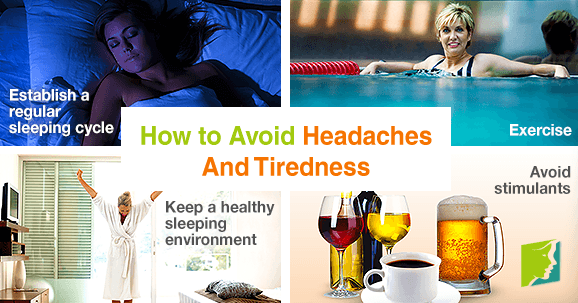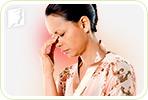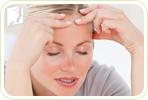Tiredness stops us from performing to the best of our ability. Without sufficient sleep, it is difficult to concentrate or exert yourself energetically, and physical aches and pains derived from tiredness are not uncommon. Headaches and tiredness can occur during the day as a result of hormonal imbalance, particularly if a task strains the mind. It's important to get between six and eight hours of restful sleep per night to prevent headaches caused by tiredness. However, this is easier said than done, so here are some tips to help you achieve a good night's sleep.
Establish a Regular Sleeping Cycle
A regular sleeping pattern is conductive to regularly achieving six to eight hours of sleep per night. Try to go to bed and wake up at the same time every evening and morning. Resist the urge to let yourself sleep late on the weekends or on your days off as this will disrupt the cycle and make it difficult to sleep at the normal time later that evening. This can cause tiredness the following day or whenever you get back into your usual routine.
Exercise
Exercise reduces the occurrence of headaches and promotes restful sleep. Try to make time for 30 minutes of moderate-intensity exercise, such as swimming, jogging, or dancing, five days a week. Moderate-intensity means you should be breathing more heavily and feel warm, but not exhausted.While exercising during the day will help your sleeping patterns, avoid working out within two hours of going to bed, as exercise stimulates internal activity that could disrupt your sleep later in the night and intensify tiredness and headaches the following day.
Keep a Healthy Sleeping Environment
Maintaining a consistently cool, ventilated body temperature is helpful for restful sleep. Avoid using central heating in your bedroom and keep a window open to bring fresh air into the room during the night.
Choice of nightwear is also important; either sleep naked or wear loose, comfortable nightwear in breathable fabrics, like cotton, to enable air to access your skin to help keep you cool during the night.
Avoid Stimulants
Alcohol and caffeine have stimulating effects in the body that trigger headaches. Headaches and tiredness are also a common symptom of a hangover after drinking alcohol, exacerbated by dehydration. Both stimulants increase internal body temperature, so drinking these in the evenings can trigger sleep disturbances. What's more, alcohol affects depth of sleep, so even if you manage to sleep for eight hours you will still most likely feel tired and may experience headaches the following day.
Some people enjoy a glass of wine or other alcoholic beverages as a means of unwinding in the evening. If you do, drink plenty of fluids to help flush toxins from your body before you go to bed and reduce dehydration, tiredness, and headaches the following day.
Recommendation
It is easy to overlook the importance of a good night's sleep, and when a person has a busy life, sleep is often sacrificed. But when headaches occur as a result of tiredness, listen to your body; this is how it tells you it's struggling. Getting enough sleep will give you physical and mental energy you need to complete tasks during the day. Prioritize your sleep as you would any other aspect of your health, and enjoy the impact on your energy levels and well-being.
Follow the links below for more information about headaches and how to treat them.
Sources
- Better Health Channel. (2011).Fatigue fighting tips. Retrieved April 2, 2014, from http://www.betterhealth.vic.gov.au/bhcv2/bhcarticles.nsf/pages/Fatigue_fighting_tips
- National Institutes of Health. (2013). Fatigue. Retrieved April 2, 2014, from http://www.nlm.nih.gov/medlineplus/ency/article/003088.htm
- National Health Service. (2013). Self-help tips to fight fatigue. Retrieved April 2, 2014, from http://www.nhs.uk/Livewell/tiredness-and-fatigue/Pages/self-help-energy-tips.aspx
- National Health Service. (2013). 10 surprisingheadache triggers. Retrieved April 2, 2014, from http://www.nhs.uk/Livewell/headaches/Pages/Headachetriggers.aspx
- Office on Women's Health. (2010).Menopause and mental health. Retrieved April 2, http://womenshealth.gov/menopause/menopause-mental-health/2014




